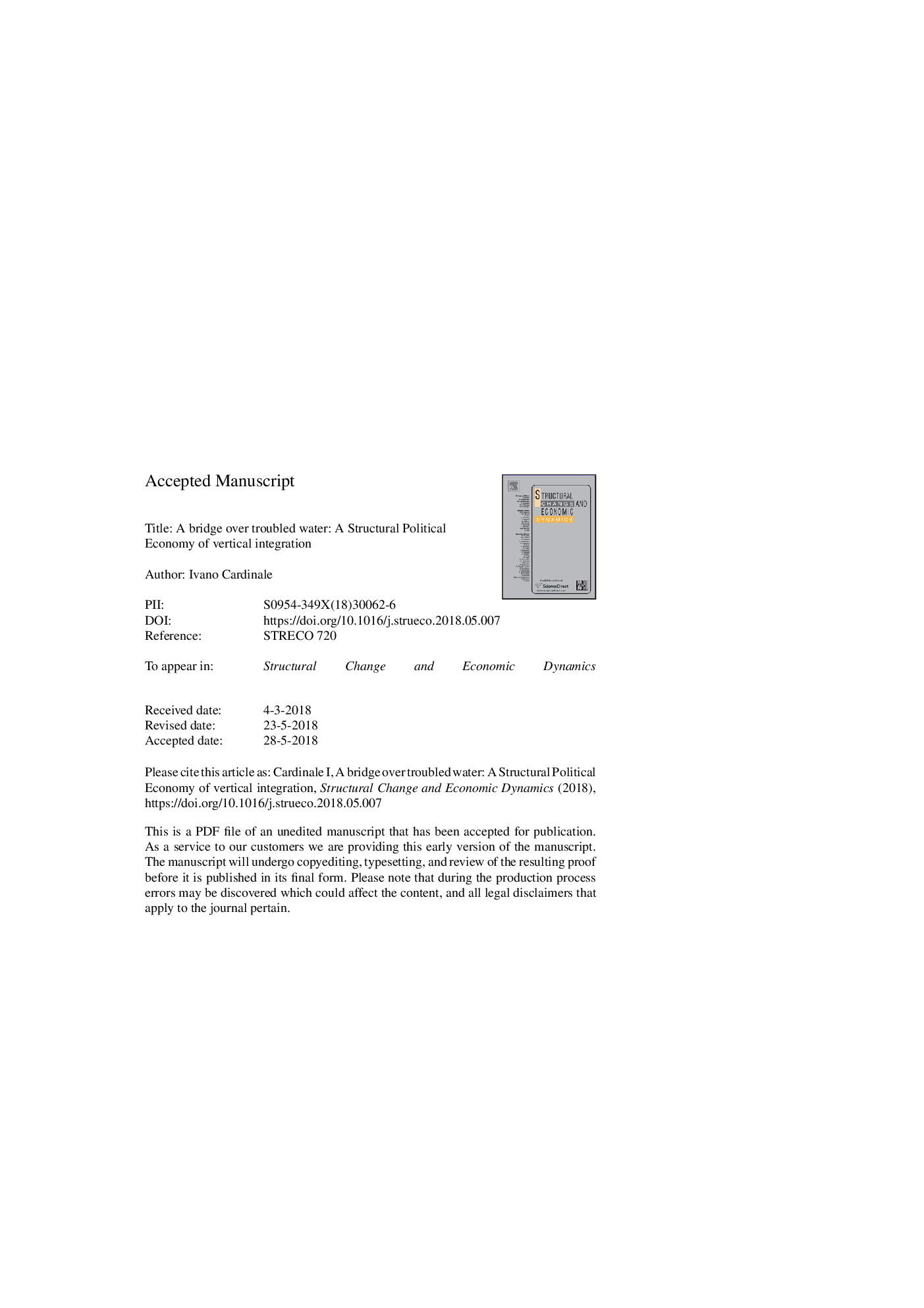| کد مقاله | کد نشریه | سال انتشار | مقاله انگلیسی | نسخه تمام متن |
|---|---|---|---|---|
| 10153843 | 1666230 | 2018 | 35 صفحه PDF | دانلود رایگان |
عنوان انگلیسی مقاله ISI
A bridge over troubled water: A Structural Political Economy of vertical integration
ترجمه فارسی عنوان
یک پل بیش از آب آشامیدنی: یک اقتصاد سیاسی ساختاری از ادغام عمودی
دانلود مقاله + سفارش ترجمه
دانلود مقاله ISI انگلیسی
رایگان برای ایرانیان
کلمات کلیدی
ترجمه چکیده
این مقاله تفسیر جدیدی از روند منطقی ادغام عمودی، کشف ابعاد اجتماعی و سیاسی آن را پیشنهاد می کند. اولین گام این است که نشان دهیم که مدل های وابستگی های صنعتی (در فرمولاسیون های لئونتیف و سرفا) و مدل های یکپارچه عمودی (در فرمول پیزینتی)، دیدگاه عمیقا متفاوت در مورد تولید، توزیع و درگیری های اجتماعی و سیاسی را بیان می کنند. گام بعدی این است که تمرکز بر فرآیند ادغام عمودی در خود - بر روی آن را "پل" بین چنین دیدگاه های مختلف. از آنجا که تحولات تحلیلی معادل سازه های اقتصادی چنین پیامدهای اجتماعی و سیاسی متنوعی دارند، ساختار اقتصادی نمی تواند به عنوان تعیین کننده ی منافع اقتصادی یا اختلافات در جامعه شناخته شود. این نتیجه یک زمینه جدید برای تجزیه و تحلیل ساختاری باز می کند: مطالعه اینکه چگونه شکل گیری منافع جامعه تحت تأثیر ساختارهای اقتصادی تاثیر می گذارد، اما مشخص نیست. در این مقاله پیشنهاد می شود مسیری برای رسیدگی به ابعاد اجتماعی و سیاسی سازه های اقتصادی، که عمدتا با تحلیل های ساختاری اقتصادی باقی مانده است.
موضوعات مرتبط
علوم انسانی و اجتماعی
اقتصاد، اقتصادسنجی و امور مالی
اقتصاد و اقتصادسنجی
چکیده انگلیسی
This article proposes a new interpretation of the logical process of vertical integration, exploring its socio-political dimension. The first step is to show that models of industrial interdependencies (in the Leontief and Sraffa formulations) and vertically integrated models (in the Pasinetti formulation) imply profoundly different views on production, distribution, and socio-political conflicts. The next step is to focus on the process of vertical integration in itself-on its being a 'bridge' between such different views. Because analytically equivalent representations of economic structures have such different socio-political implications, economic structures cannot be seen as univocally determining economic interests or conflicts in society. This result opens up a new field for structural analysis: studying how the formation of interests in society is influenced, but not determined, by economic structures. The article suggests a route to address the socio-political dimension of economic structures, which is largely left on the background by structural economic analysis.
ناشر
Database: Elsevier - ScienceDirect (ساینس دایرکت)
Journal: Structural Change and Economic Dynamics - Volume 46, September 2018, Pages 172-179
Journal: Structural Change and Economic Dynamics - Volume 46, September 2018, Pages 172-179
نویسندگان
Ivano Cardinale,
